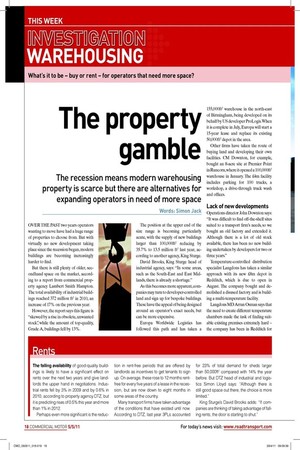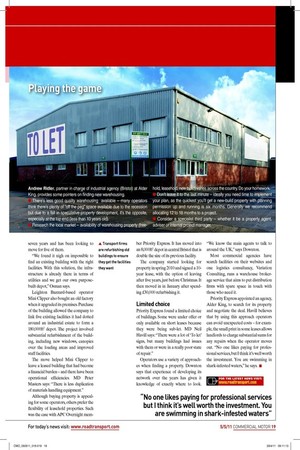The property gamble
Page 16

Page 17

If you've noticed an error in this article please click here to report it so we can fix it.
The recession means modern warehousing property is scarce but there are alternatives for expanding operators in need of more space
Words: Simon Jack
OVER THE PAST two years operators wanting to move have had a huge range of properties to choose from. But with virtually no new development taking place since the recession began, modern buildings are becoming increasingly harder to ind.
But there is still plenty of older, secondhand space on the market, according to a report from commercial property agency Lambert Smith Hampton. The total availability of industrial buildings reached 372 million ft2 in 2010, an increase of 17% on the previous year.
However, the report says this igure is “skewed by a rise in obsolete, unwanted stock”, while the amount of top-quality, Grade A, buildings fell by 13%.
The position at the upper end of the size range is becoming particularly acute, with the supply of new buildings larger than 100,000ft2 reducing by 35.7% to 13.5 million ft2 last year, according to another agency, King Sturge.
David Brooks, King Sturge head of industrial agency, says: “In some areas, such as the South-East and East Midlands, there is already a shortage.” As this becomes more apparent, companies may turn to developer-controlled land and sign up for bespoke buildings. These have the appeal of being designed around an operator’s exact needs, but can be more expensive.
Europa Worldwide Logistics has followed this path and has taken a
155,000ft2 warehouse in the north-east of Birmingham, being developed on its behalf by US developer ProLogis. When it is complete in July, Europa will start a 15-year lease and replace its existing 50,000ft2 depot in the area.
Other irms have taken the route of buying land and developing their own facilities. CM Downton, for example, bought an 8-acre site at Premier Point in Runcorn, where it opened a 100,000ft2 warehouse in January. The £4m facility includes parking for 100 trucks, a workshop, a drive-through truck wash and ofices.
Lack of new developments
Operations director John Downton says: “It was dificult to ind off-the-shelf sites suited to a transport irm’s needs, so we bought an old factory and extended it. Although there is a lot of old stock available, there has been no new building undertaken by developers for two or three years.” Temperature-controlled distribution specialist Langdons has taken a similar approach with its new £8m depot in Redditch, which is due to open in August. The company bought and demolished a disused factory and is building a multi-temperature facility.
Langdons MD Arran Osman says that the need to create different temperature chambers made the task of inding suitable existing premises extremely hard – the company has been in Redditch for seven years and has been looking to move for ive of them.
“We found it nigh on impossible to ind an existing building with the right facilities. With this solution, the infrastructure is already there in terms of utilities and we get our own purposebuilt depot,” Osman says.
Leighton Buzzard-based operator Mini Clipper also bought an old factory when it upgraded its premises. Purchase of the building allowed the company to link ive existing facilities it had dotted around an industrial estate to form a 180,000ft2 depot. The project involved substantial refurbishment of the building, including new windows, canopies over the loading areas and improved staff facilities.
The move helped Mini Clipper to leave a leased building that had become a inancial burden – and there have been operational eficiencies. MD Peter Masters says: “There is less duplication of materials handling equipment.” Although buying property is appealing for some operators, others prefer the lexibility of leasehold properties. Such was the case with APC Overnight mem
ber Priority Express. It has moved into an 8,000ft2 depot in central Bristol that is double the size of its previous facility.
The company started looking for property in spring 2010 and signed a 10year lease, with the option of leaving after ive years, just before Christmas. It then moved in in January after spending £30,000 refurbishing it.
Limited choice
Priority Express found a limited choice of buildings. Some were under offer or only available on short leases because they were being sub-let. MD Neil Havill says: “There were a lot of ‘To let’ signs, but many buildings had issues with them or were in a really poor state of repair.” Operators use a variety of approaches when inding a property. Downton says that experience of developing its network over the years has given it knowledge of exactly where to look. “We know the main agents to talk to around the LTK,” says Downton.
Most commercial agencies have search facilities on their websites and one logistics consultancy, Variation Consulting, runs a warehouse brokerage service that aims to put distribution irms with spare space in touch with those who need it.
Priority Express appointed an agency, Alder King, to search for its property and negotiate the deal. Havill believes that by using this approach operators can avoid unexpected costs – for example, the small print in some leases allows landlords to charge substantial sums for any repairs when the operator moves out. “No one likes paying for professional services, but I think it’s well worth the investment. You are swimming in shark-infested waters,” he says. ■
















































